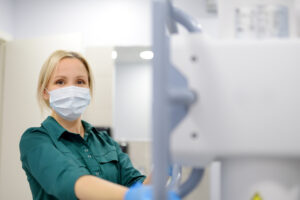If your practice is providing diagnostic imaging and radiation oncology services, it is important to ensure that you achieve the Diagnostic Imaging Accreditation Scheme (DIAS) certification in order to be eligible for Medicare benefits. Since May 2020, when the new regulations regarding capital sensitivity arrangements came into effect, practices have been required to be registered for a Location Specific Provider Number (LSPN) and be accredited for diagnostic imaging services.
Is This a Requirement for All Radiation Oncology Services Providers?
No. This Medicare eligibility requirement only applies to those radiation oncology services providers who are also providing diagnostic imaging services. If you only supply radiation oncology services, you do not need to be DIAS accredited.
How Does it Apply to Practice Sites or Mobile Equipment?
Mobile and practice sites are also required to achieve DIAS certification if they are providing diagnostic imaging services. In order to register and complete the process, you will have to have a base location for the mobile diagnostic imaging equipment (i.e., where it is located when not in use) or the location of the site where the imaging services are performed. If you provide most of your services offsite, it is important to identify as a base location for mobile diagnostic imaging equipment.
Inside the DIAS Accreditation Process for Qualifying Radiation Oncology Services Providers
Step #1 – The first step is to register for a Location Specific Practice Number (LSPN). If you already have one, first check that it is fully updated with the correct details. Once these forms are processed, an LSPN will be allocated to your practice and your equipment will be registered.
Step #2 – After the first step is complete, you can start the process of meeting the standards required to achieve DIAS certification. This is a fairly intensive process that encompasses all areas of your practice, from personnel and patient communication to patient care, best practices, equipment and technology, radiation safety protocols and revenue.
For new practices, you can opt for partial accreditation first before you move to full accreditation. This option is available for practices that are getting accreditation for the first time. This allows you to achieve 3 standards, allowing an additional 2 years to achieve the full suite of standards. If you are an established practice, then you will need to meet all 15 accreditation standards.
Step #3 – After achieving the necessary standards for DIAS certification, practices go into a maintenance phase. Standards will have to be maintained regularly, and the practice will have to reapply for DIAS certification every 4 years in order to keep pace with evolving standards, technology, best practices and regulations.
What is the Fastest, Most Reliable Way to Achieve DIAS Certification?
While many practices see the benefits of the DIAS accreditation process, the administrative burden of applying for, achieving and maintaining DIAS certification is a challenge.
In order to meet this need for a fast, professional and reliable solution, Excelsior Accreditation has developed a professional service to manage all aspects of the accreditation process.
Available to all qualifying practices requiring mandatory DIAS accreditation, including mobile and location-based practices offering diagnostic imaging and radiation oncology services, our team provides an end-to-end service for both partial and full DIAS accreditation as well as ongoing maintenance to keep your practice compliant and aligned with the scheme to ensure efficient, hassle-free renewal every 4 years. Contact us today for more information or a free consultation.






